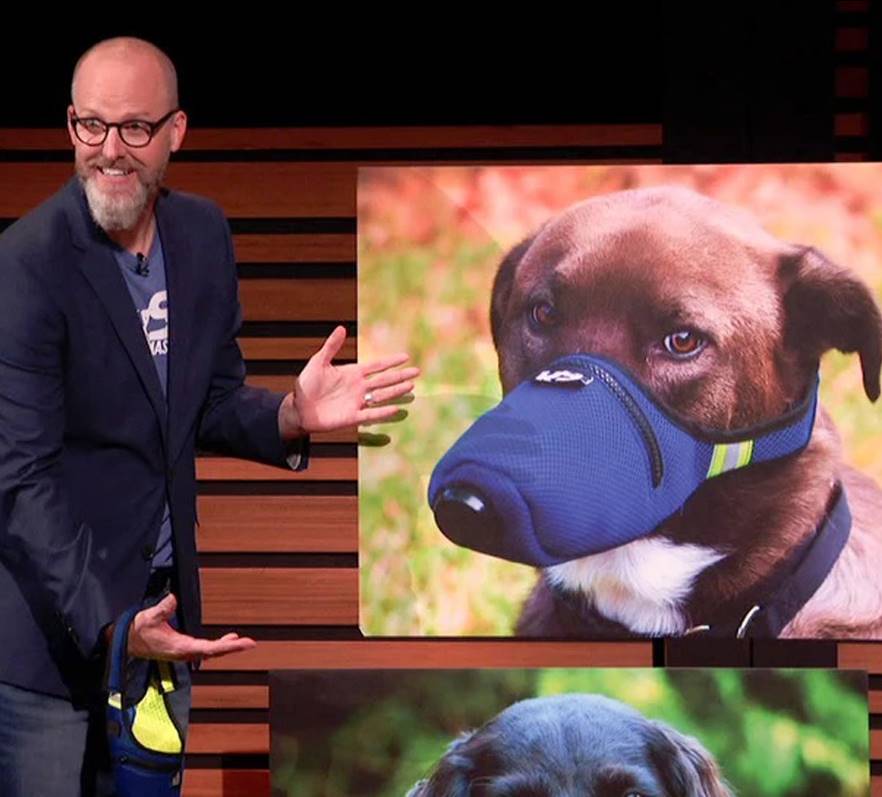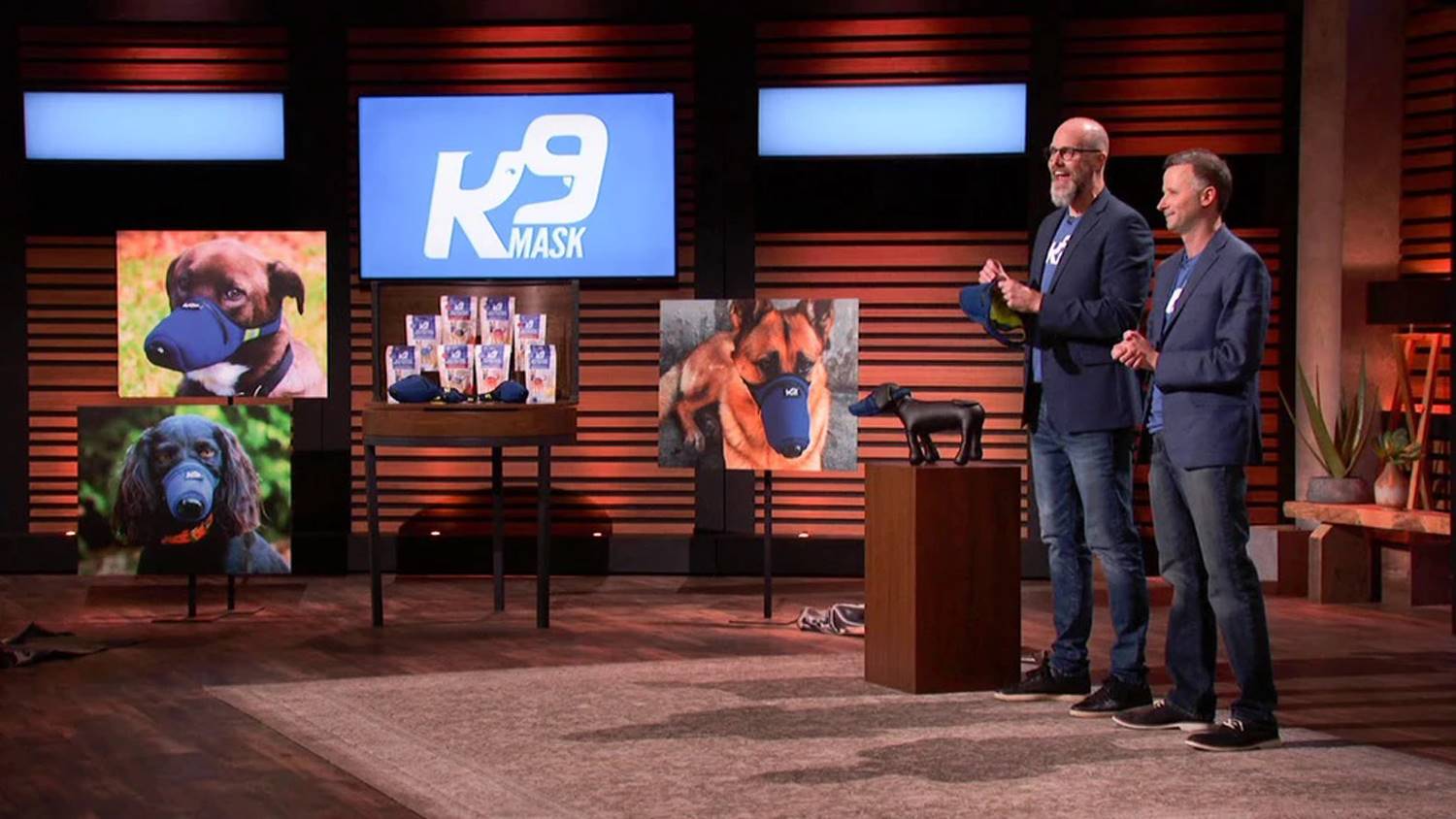
Kirby Holmes’ air filter mask for dogs was featured on “Shark Tank.”
Kirby Holmes has always been concerned about wildfires.
As a child growing up in Houston, Holmes spent a few weeks each summer visiting his
grandparents. They lived in the small city of Ojai, tucked into the foothills of Southern
California, and even back then, wildfires were an issue. One summer, the wildfires
reached the hills right behind his grandparents' home.
"I had this sort of dreaded sense that my grandparents were going to be burned up
in these fires and we were all going to die," Holmes said. "I thought their dog, a
black lab named Sugar, was going to die in these fires. So, it really scared me as
a kid."
He didn't know it then, but that feeling would stay with him for decades. In 2017, wildfires again threatened the state.
"Some of the neighborhoods were being destroyed and people were losing their lives," he said. "It brought back to me that fear I had when I was a kid, but it was actually now happening – it was being realized."
Holmes couldn't do anything to save the homes, but he knew he could help the people and their pets. So, with his grandparents and Sugar in mind, he set out to do just that.
You see, Holmes ran a business selling air filter masks.

Inspiration Strikes
He had gone into mission work in Russia after graduating from Texas Tech University in 1994, but by 2015, Holmes and his wife were back in Texas. On a random Friday night, he had an unexpected encounter that changed the trajectory of his career.
He was on a date with his wife, drinking coffee and flipping through magazines in a bookstore. After a restroom break, he was washing his hands when another man walked in.
"He went to the mirror, checked his hair, made sure he was looking good, and he was going to walk right out and go back to his date," Holmes said. "But if that was his only purpose of being there, what made me laugh was that he wearing a surgical mask. Before pandemic life, it was just a very uncommon thing to see, especially to see him be so particular about, 'Do I look good?' I just couldn't shake that."
A few months later, he saw a news story about masks that accessorized with men's clothing. Remembering the man from the bathroom, Holmes was inspired to make these kinds of stylish masks more easily available. He began to buy patterned air filter masks on Amazon and sell them on his own website.
A Possible Solution
In 2017, as the California wildfires intensified, they blanketed part of the state in heavy smoke. Even people miles from the fires were dealing with the air pollution. In the midst of the situation, a visitor to Holmes' mask website searched for something different: an air filter mask for a dog.
"I didn't have anything like that – I'd never even heard of anything like that," Holmes
admitted. "But I put those pieces together. I realized that would have been a solution
for my grandparents' dog, Sugar. If those fires had come over the hill to my grandparents'
neighborhood, I would have loved for Sugar to be protected.
"So, I started searching to see where air filter masks for dogs were being sold, and
I couldn't find them anywhere in the world."
With the idea to create an air filter mask for dogs now firmly planted in his brain, Holmes reached out to his cousin, Evan Daugherty, a "designer, tinkerer and engineer" who works at Dell Technologies. The pair began building prototypes for what they termed the K9 Mask® and, at the same time, Holmes launched a website to see if there was a market for such a product.
"We created a sign-up page where, if people were interested, they could give us their email address," Holmes said. "Turns out, 1,000 people gave us their email address, saying, 'Yeah, because of these wildfires, I would love a solution for my dog.'"
As they finalized their design in late 2018, however, they realized they needed funding to bring their design to life. After contributing $7,000 of their own money, Holmes and Daugherty launched a Kickstarter campaign. In early 2019, they sent a message to those 1,000 email addresses, inviting their potential customers to help fund the first air filter mask for dogs in exchange for a free mask. Ultimately, they raised more than $10,000.
By the end of their initial production run in June 2019, they had fulfilled the mask orders from their donors and began to fulfill presale orders through their new website, K9Mask.com.
Little did they know, their demand was about to increase.
Expanded Uses
By the end of 2019, California had faced more wildfires. From late 2019 to early 2020, Australia battled one of its worst bush fire seasons in recent memory. Although Holmes and Daugherty launched their product in response to wildfires, they soon realized it had a much broader appeal.
In June 2020, rioters hit the streets of Hong Kong. As pet owners living in the city took their dogs out to use the bathroom, the tear gas burned the animals' eyes and lungs. Holmes and Daugherty began filling orders from China.
Orders also abounded within the U.S., particularly around the coasts, where people were dealing with an environmental phenomenon called "red tide." The common term for a harmful algal bloom, red tides occur when colonies of algae in the water grow out of control, producing harmful or even toxic effects on people, fish, shellfish, marine mammals and birds.
"During the red tides, there's a toxin that kills off all the fish," Holmes said. "They get washed up on the beach, the fish decay and this toxin becomes an aerosol on the beach. It smells horrible, but also, it can be damaging to people's respiratory systems. So we've been selling masks to people on the coasts, where they experience these red tide toxins.
"Also, in Hawaii, there was a volcanic eruption about two years ago and a lot of that ash blew into some urban areas in and around Honolulu. There are chemicals in that volcanic ash that people wanted to be protected from, so people were buying it for their dogs because of that."
Holmes explained that in all these cases, what happens is very similar: tiny particles of harmful material in the air are inhaled into a dog's lungs, where they pass into its bloodstream and eventually get pumped through its heart – a process that negatively affects the animal's health.
"It turns out there are all these other reasons, from dust to volcanic ash to red tide toxins, that a mask is useful," he said. "There are so many edible things a dog can get into, too – mold, fungus, particular soils that are very harmful to dogs – so it's not only aerosols this mask can protect against. We're discovering all these needs, and our mask is now somehow a solution to all kinds of things."
With demand increasing, and $200,000 in sales under their belts, the cousins began to look at options to grow their business. That's when they got a lucky break.
'Shark Tank'
Out of some 47,000 applicants to appear on Season 12 of the ABC hit show, "Shark Tank," K9 Mask was one of only a handful chosen. For Holmes, whose Texas Tech degree is in communication studies, it was a moment he was prepared for.
"I was trained in communication," he said. "The skills of my degree were being able to present information, facts, story and persuasion in front of groups of people to help them understand a product or idea. So, when I'm put in a situation where investors want to understand my business or product, I have to communicate and I have to persuade. I feel like my degree from Texas Tech was very useful for me in that moment in the shark tank."
Episode 6, which featured K9 Masks, was broadcasted Nov. 20.
"To be one of the few who are selected to actually get in the tank with the sharks, and to present our business and to present our product, to me, it's an honor," Holmes said. "'Shark Tank' provided a platform to tell more people that this now exists, that there's a new solution for their pets' health, so for us, there's incredible marketing value to it."
But in addition to making K9 Mask more visible, Shark Tank gave the cousins a new funding source. They were hoping for $200,000 in exchange for a 20% stake in their company. After FUBU creator Daymond John offered $200,000 for a 45% stake, negotiations began. By the end of their segment, they agreed on a 40% stake.
Since the show's filming, back in the summer, John's team has been doing its homework to finalize that deal.
"You see that disclaimer before 'Shark Tank' starts, that you're about to watch a live business negotiation," Holmes noted. "That negotiation continues outside of the entertainment value of the show, so we're still in that negotiation process. No investor will make a final investment decision just based on 20-minute presentation. It takes them looking at business financials and understanding the future business plan, so he and his team are doing their due diligence about our business to finalize his investment."

Making a Difference
While Holmes and Daugherty were thrilled to get an offer, the sharks gave them a lot to think about.
"One of the things the sharks said was, it felt like our prices may be too high," Holmes said. "We need to consider that. I think people will pay to be healthy – they would pay for themselves to have things to help them be healthy, and for their pets, but we want to sell at a reasonable price. Right now, we're making all masks in Dallas, and they're fantastic. But we're going to have to find ways to lower our price through materials that we purchase or through the labor for producing them."
Dallas Mavericks owner Mark Cuban compared the K9 Mask to a fire extinguisher, which may seem ironic, considering its inspiration.
"The fire extinguisher is not a completely sexy product, but everybody needs one," Holmes remembered Cuban explaining, "and you really know you need one when there's a fire in your kitchen. You need it right then. You don't have time to wait, or go to the store, or buy it on Amazon; you need it right then."
And it appears many people in the public agree, as sales have been up since K9 Mask appeared on "Shark Tank." But while Holmes said he's thrilled, it's not just for the reasons you might think.
"When it comes to selling our products, the thing we think about the most is, how do we help protect more animals that are in a crisis situation that might hurt their short-term and long-term health?" Holmes said. "So the fact that we've come up with something that does that every time it makes sales, it makes us feel good that a pet owner is going to have their pet around flourishing in their family for as long as possible."
Article written by Glenys Young, Texas Tech Today
